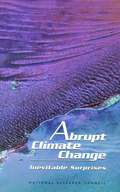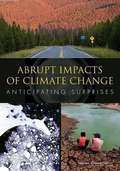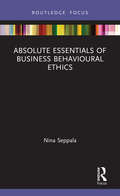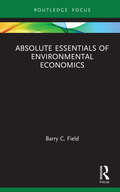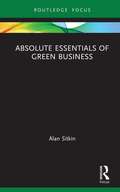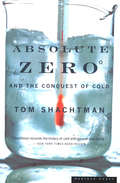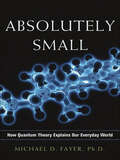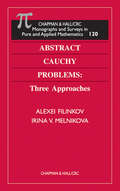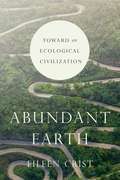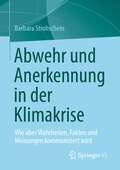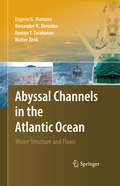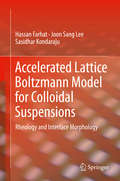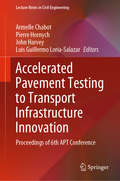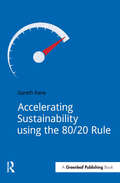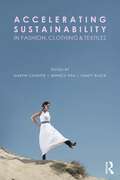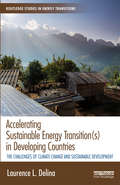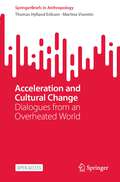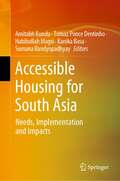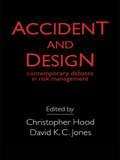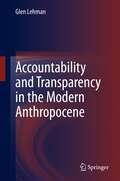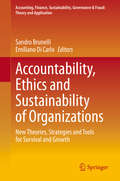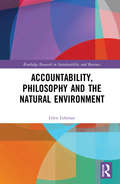- Table View
- List View
Abrupt Climate Change: Inevitable Surprises
by Committee on Abrupt Climate ChangeThe National Academies Press (NAP)--publisher for the National Academies--publishes more than 200 books a year offering the most authoritative views, definitive information, and groundbreaking recommendations on a wide range of topics in science, engineering, and health. Our books are unique in that they are authored by the nation's leading experts in every scientific field.
Abrupt Impacts of Climate Change
by National Research Council Division on Earth and Life Studies Board on Atmospheric Sciences and Climate Committee on Understanding and Monitoring Abrupt Climate Change and Its ImpactsClimate is changing, forced out of the range of the past million years by levels of carbon dioxide and other greenhouse gases not seen in the Earth's atmosphere for a very, very long time. Lacking action by the world's nations, it is clear that the planet will be warmer, sea level will rise, and patterns of rainfall will change. But the future is also partly uncertain -- there is considerable uncertainty about how we will arrive at that different climate. Will the changes be gradual, allowing natural systems and societal infrastructure to adjust in a timely fashion? Or will some of the changes be more abrupt, crossing some threshold or "tipping point" to change so fast that the time between when a problem is recognized and when action is required shrinks to the point where orderly adaptation is not possible? Abrupt Impacts of Climate Change is an updated look at the issue of abrupt climate change and its potential impacts. This study differs from previous treatments of abrupt changes by focusing on abrupt climate changes and also abrupt climate impacts that have the potential to severely affect the physical climate system, natural systems, or human systems, often affecting multiple interconnected areas of concern. The primary timescale of concern is years to decades. A key characteristic of these changes is that they can come faster than expected, planned, or budgeted for, forcing more reactive, rather than proactive, modes of behavior. Abrupt Impacts of Climate Change summarizes the state of our knowledge about potential abrupt changes and abrupt climate impacts and categorizes changes that are already occurring, have a high probability of occurrence, or are unlikely to occur. Because of the substantial risks to society and nature posed by abrupt changes, this report recommends the development of an Abrupt Change Early Warning System that would allow for the prediction and possible mitigation of such changes before their societal impacts are severe. Identifying key vulnerabilities can help guide efforts to increase resiliency and avoid large damages from abrupt change in the climate system, or in abrupt impacts of gradual changes in the climate system, and facilitate more informed decisions on the proper balance between mitigation and adaptation. Although there is still much to learn about abrupt climate change and abrupt climate impacts, to willfully ignore the threat of abrupt change could lead to more costs, loss of life, suffering, and environmental degradation. Abrupt Impacts of Climate Change makes the case that the time is here to be serious about the threat of tipping points so as to better anticipate and prepare ourselves for the inevitable surprises.
Abschied vom Eis: Ein Weckruf aus der Arktis
by Peter WadhamsDas Meereis der Polargebiete ist nicht nur wunderschön, es reguliert auch die Temperatur der Erde. Doch es zieht sich zurück – und zwar schnell! Dabei laufen komplexe Rückkopplungen ab, die das Potenzial haben, den Klimawandel zu beschleunigen und zu verstärken. Der britische Polarforscher Peter Wadhams ist einer der international führenden Meereisexperten. Er greift auf seine fast lebenslange Forschung in der Arktis zurück, um zu erklären, was gerade passiert, was das für unsere Zukunft bedeutet – und was wir tun können und müssen.Der AutorPeter Wadhams ist einer der weltweit erfahrensten Polar- und Meereisforscher. Er war von 1987–92 Direktor des Scott Polar Institute in Cambridge und dort auch von 1992–2015 Professor für Physik der Ozeane. Er war an mehr als 50 Expeditionen in beide Polarregionen beteiligt – in Forschungscamps, auf Eisbrechern, von Flugzeugen aus, und sogar in Unterseebooten. Er wurde ausgezeichnet mit dem W. S. Bruce-Preis der Royal Society of Edinburgh (1977), der UK Polar Medal (1987) und dem Italgas-Preis für Umweltwissenschaften (1990). Er ist Fellow der Royal Geographical Society und Mitglied der Finnischen Akademie.
Absolute Essentials of Business Behavioural Ethics (Absolute Essentials of Business and Economics)
by Nina SeppalaBehavioural ethics in business is an emerging field that has challenged some of the established wisdom about ethics and added some truly new insights into our understanding about decision-making and behaviour. Why do seemingly responsible employees and managers sometimes act in bad ways? This book explains how people behave in real situations and what action can be taken to nudge behaviour in a more ethical direction. This concise textbook is ideal for use in the classroom as core or additional reading on courses in business ethics and corporate social responsibility; organisational behaviour and psychology; and any module with ethics content (for example, accounting ethics and strategic management). Each chapter is presented as a story with details about the experimental designs and related research findings. The key features include learning outcomes, suggested class activities, mock assessment questions, and an annotated list of key readings and these provide a one-stop text for tutors and students interested in this increasingly important area of study.
Absolute Essentials of Environmental Economics (Absolute Essentials of Business and Economics)
by Barry C. FieldThis shortform textbook provides a concise overview of the fundamentals of environmental economics. It focuses on how economic forces affect the natural environment and how economic policies and behaviors may be altered to improve environmental quality. Spanning ten chapters, the book introduces readers to the key ideas in environmental economics. Topics include environmental externalities, technological change, cost-benefit analysis, pollution charges, emissions and offset trading, climate change, and public policy. Written by an established educator and scholar, Absolute Essentials of Environmental Economics will be valuable reading for students of environmental economics, environmental policy, environmental management and related areas. People affiliated with environmental interest groups, "think tanks," and advocacy groups will also find it beneficial.
Absolute Essentials of Green Business (Absolute Essentials of Business and Economics)
by Alan SitkinThis short textbook provides a core understanding of the intersection between business and the natural environment. The sector’s rapid expansion means that many university programmes are focusing to a greater extent nowadays on the career opportunities generated by the ecological imperative – a curriculum increasingly referred to as "green business". Climate breakdown is a devastating issue facing contemporary society. With six out of the ten largest multinationals listed in the 2018 Fortune Global 500 being active in the energy sector, it is no surprise that more and more business schools are offering modules addressing the management of natural resources. The business world has made some progress incorporating green principles into their strategies and operations, but progress needs to accelerate in line with global agreements to prevent catastrophic ecological and environmental problems. Absolute Essentials of Green Business stands out because of its singular focus on a subset of this wider curricular area. By covering both the macro (framework) and micro (business strategy) aspects of the topic, the book’s structure is in line with the way modules of this nature are taught in universities today. Students of business and environmental studies will benefit from reading this concise textbook in order to develop their understanding of a fundamental element of the social science curriculum.
Absolute Zero and the Conquest of Cold
by Tom Shachtman&“A lovely, fascinating book, which brings science to life.&” —Alan Lightman Combining science, history, and adventure, Tom Shachtman &“holds the reader&’s attention with the skill of a novelist&” as he chronicles the story of humans&’ four-centuries-long quest to master the secrets of cold (Scientific American). &“A disarming portrait of an exquisite, ferocious, world-ending extreme,&” Absolute Zero and the Conquest of Cold demonstrates how temperature science produced astonishing scientific insights and applications that have revolutionized civilization (Kirkus Reviews). It also illustrates how scientific advancement, fueled by fortuitous discoveries and the efforts of determined individuals, has allowed people to adapt to—and change—the environments in which they live and work, shaping man&’s very understanding of, and relationship, with the world. This &“truly wonderful book&” was adapted into an acclaimed documentary underwritten by the National Science Foundation and the Alfred P. Sloan Foundation, directed by British Emmy Award winner David Dugan, and aired on the BBC and PBS&’s Nova in 2008 (Library Journal). &“An absorbing account to chill out with.&” —Booklist
Absolutely Small: How Quantum Theory Explains Our Everyday World
by Michael D. FayerAbsolutely Small presents (and demystifies) the world of quantum science like no book before.Physics is a complex, daunting topic, but it is also deeply satisfying?even thrilling. When liberated from its mathematical underpinnings, physics suddenly becomes accessible to anyone with the curiosity and imagination to explore its beauty. Science without math? It&’s not that unusual.For example, we can understand the concept of gravity without solving a single equation. So for all those who may have pondered what makes blueberries blue and strawberries red; for those who have wondered if sound really travels in waves; and why light behaves so differently from any other phenomenon in the universe, it&’s all a matter of quantum physics.This book explores in considerable depth scientific concepts using examples from everyday life, such as:particles of light,probability,states of matter,what makes greenhouse gases badChallenging without being intimidating, accessible but not condescending, Absolutely Small develops your intuition for the very nature of things at their most basic and intriguing levels.
Abstract Cauchy Problems: Three Approaches (Chapman & Hall/CRC Monographs and Research Notes in Mathematics)
by Irina V. Melnikova Alexei FilinkovAlthough the theory of well-posed Cauchy problems is reasonably understood, ill-posed problems-involved in a numerous mathematical models in physics, engineering, and finance- can be approached in a variety of ways. Historically, there have been three major strategies for dealing with such problems: semigroup, abstract distribution, and regularizat
Abundant Earth: Toward an Ecological Civilization
by Eileen CristIn Abundant Earth, Eileen Crist not only documents the rising tide of biodiversity loss, but also lays out the drivers of this wholesale destruction and how we can push past them. Looking beyond the familiar litany of causes—a large and growing human population, rising livestock numbers, expanding economies and international trade, and spreading infrastructures and incursions upon wildlands—she asks the key question: if we know human expansionism is to blame for this ecological crisis, why are we not taking the needed steps to halt our expansionism? Crist argues that to do so would require a two-pronged approach. Scaling down calls upon us to lower the global human population while working within a human-rights framework, to deindustrialize food production, and to localize economies and contract global trade. Pulling back calls upon us to free, restore, reconnect, and rewild vast terrestrial and marine ecosystems. However, the pervasive worldview of human supremacy—the conviction that humans are superior to all other life-forms and entitled to use these life-forms and their habitats—normalizes and promotes humanity’s ongoing expansion, undermining our ability to enact these linked strategies and preempt the mounting suffering and dislocation of both humans and nonhumans.Abundant Earth urges us to confront the reality that humanity will not advance by entrenching its domination over the biosphere. On the contrary, we will stagnate in the identity of nature-colonizer and decline into conflict as we vie for natural resources. Instead, we must chart another course, choosing to live in fellowship within the vibrant ecologies of our wild and domestic cohorts, and enfolding human inhabitation within the rich expanse of a biodiverse, living planet.
Abwehr und Anerkennung in der Klimakrise: Wie über Wahrheiten, Fakten und Meinungen kommuniziert wird
by Barbara StrohscheinAuf Wahrheiten, Fakten und Meinungen zur Klimafrage wird häufig öffentlich wie privat mit psychischer oder sozialer Abwehr reagiert. Gestützt auf ausgewählte psychologische und philosophische Theorien sowie Datenmaterial wird in diesem Buch gezeigt, wie Abwehr zustande kommt, wie sie wirkt und wie andererseits die notwendige Anerkennung auf verschiedenen Ebenen gelingen kann. Erst durch Anerkennung werden konstruktive Diskurse möglich. Dieses Buch bietet alle Grundlagen, um Kommunikationskonflikte zwischen Abwehr und Anerkennung in der Klimakrise theoretisch und praktisch lösen zu können.
Abyssal Channels in the Atlantic Ocean: Water Structure and Flows
by Alexander N. Demidov Eugene G. Morozov Roman Y. Tarakanov Walter ZenkThis book is dedicated to the study of structure and transport of deep and bottom waters through underwater channels of the Atlantic Ocean. The study is based on recent observations, analysis of historical data, and literature review. A strong flow of Antarctic Bottom Water from the Argentine Basin to the Brazil Basin through the Vema Channel (32 -27 S) is studied on the basis of CTD sections combined with LADCP profiling carried out annually and long-term moored measurements. The flow in the Vema Channel is mixed in the vertical direction but horizontally stratified. The mean speed of the flow is 30 cm/s and water transport is approximately 3.5 Sv. Owing to the bottom Ekman friction the dense core of the flow is usually displaced to the eastern wall of the channel. A temperature increase was found in the deep Vema Channel, which has been observed for 30 years already. The further flow of bottom water in the Brazil Basin splits in the northern part of the basin. Part of water flows to the East Atlantic basins through the Romanche and Chain fracture zones. The other part is a northwestern flow to the North American Basin. Part of the northwesterly flow propagates through the Vema Fracture Zone (11 N) into the Northeastern Atlantic basins. Flows in the Romanche, Chain, and Vema fracture zones were studied recently by CTD and LADCP profiling. An underwater cataract was found in the Chain Fracture Zone. Recent measurements in the Kane Gap show that the flow of bottom water there is characterized by alternative transport in time. The Northeastern Atlantic basins are filled with the bottom water flowing through the Vema Fracture Zone. The flows of bottom waters through the Romanche and Chain fracture zones do not spread to the Northeast Atlantic due to strong mixing in the equatorial zone and enhanced transformation of bottom water properties. Extra material: The CTD data sets collected in abyssal channels of the Atlantic Ocean can be downloaded from http://extras.springer.com. The access to the data is organized either by means of a clickable map or tables. Investigators can download individual casts organized by the year of the experiment or its location. The CTD data are organized in the form of a heading and three columns (pressure, temperature, salinity). The style is similar to the WOCE format. A line with coordinates is added to the heading.
Accelerated Lattice Boltzmann Model for Colloidal Suspensions: Rheology and Interface Morphology
by Hassan Farhat Joon Sang Lee Sasidhar KondarajuColloids are ubiquitous in the food, medical, cosmetics, polymers, water purification, and pharmaceutical industries. The thermal, mechanical, and storage properties of colloids are highly dependent on their interface morphology and their rheological behavior. Numerical methods provide a convenient and reliable tool for the study of colloids. Accelerated Lattice Boltzmann Model for Colloidal Suspensions introduce the main building-blocks for an improved lattice Boltzmann-based numerical tool designed for the study of colloidal rheology and interface morphology. This book also covers the migrating multi-block used to simulate single component, multi-component, multiphase, and single component multiphase flows and their validation by experimental, numerical, and analytical solutions. Among other topics discussed are the hybrid lattice Boltzmann method (LBM) for surfactant-covered droplets; biological suspensions such as blood; used in conjunction with the suppression of coalescence for investigating the rheology of colloids and microvasculature blood flow. The presented LBM model provides a flexible numerical platform consisting of various modules that could be used separately or in combination for the study of a variety of colloids and biological flow deformation problems.
Accelerated Pavement Testing to Transport Infrastructure Innovation: Proceedings of 6th APT Conference (Lecture Notes in Civil Engineering #96)
by John Harvey Armelle Chabot Pierre Hornych Luis Guillermo Loria-SalazarThis volume gathers the latest advances, innovations, and applications in the field of accelerated pavement testing (APT), presented at the 6th International Conference on Accelerated Pavement Testing, in Nantes, France, on September 27-29, 2021. Discussing APT, which involves rapid testing of full-scale pavement constructions for structural deterioration, the book covers topics such as APT facilities, APT of asphalt concrete and sustainable/innovative materials, APT for airfield pavements, testing of maintenance and rehabilitation solutions, testing of smart and multi-functional pavements, data analysis and modeling, monitoring and non-destructive testing, and efficient means of calibrating/developing pavement design methods. Featuring peer-reviewed contributions by leading international researchers and engineers, the book is a timely and highly relevant resource for materials scientists and engineers interested in determining the performance of pavement structures during their service life (10+ years) in a few weeks or months.
Accelerating Sustainability Using the 80/20 Rule
by Gareth KaneAre your sustainability efforts making as much impact as they could be?With our collective way of life rubbing up against the natural limits of the planet, it does not take a genius to see that it is time to scrape the mud off our boots and find a shorter, smarter path towards sustainability – a way to maximize our effectiveness and inspire leaps forward in sustainability, rather than incremental steps. The 80/20 rule says that, in many situations, a small number of inputs determine the vast majority of our desired results. If we identify these “vital few” inputs in our sustainability efforts, and focus on them, we can maximize our effectiveness and accelerate progress rapidly. This book will help you to think about sustainability from an 80/20 perspective with practical applications for: product and service development; supply chains; materiality, indicators and quantitative analysis; waste, energy efficiency, water conservation and transport; employee engagement and sustainability strategy. If you want to focus on what works, deliver better results, waste less time on “switch it off” stickers and ineffective “standard practice” and start making a real difference, then this book is for you!
Accelerating Sustainability in Fashion, Clothing and Textiles
by Sandy Black Martin Charter Bernice PanThe issue of sustainability is characterised as a ‘wicked problem’ in the fashion, clothing and textiles sector and is now coming into increased focus due to growing consumer, business and policy pressures. This in-depth volume presents a comprehensive overview of the challenges and emerging opportunities faced by the sector, and provides strategic solutions as to how the sector can substantially accelerate sustainability. This book collates research and industry best practice to provide a ‘one-stop shop’ exploring the complex and interconnected issues surrounding sustainability in fashion, clothing and textiles. The practical and digestible chapters include innovative examples and perspectives from different regions of the globe, addressing topics from policies to supply chain issues and materials innovation. Five unique case studies of sustainable businesses provide detailed examples of pioneering practice. Edited by three professionals with long-standing knowledge and expertise, the book takes a global perspective with examples that illustrate the scale and breadth of topics and regions in the scope of sustainability. This holistic approach brings together both academic and industry perspectives on the critical areas that require immediate action to move towards a more sustainable fashion, clothing and textile sector. This is an invaluable resource for those working in the industry, policymakers and for those in business or academia with an interest in sustainability in fashion, clothing, textiles and related sectors worldwide. It is also relevant to professionals and students in the areas of sustainability, innovation, supply chains, design and development, consultancy, education and training.
Accelerating Sustainable Energy Transition: The challenges of climate change and sustainable development (Routledge Studies in Energy Transitions)
by Laurence L DelinaAccelerating sustainable energy transitions away from carbon-based fuel sources needs to be high on the agendas of developing countries. It is key in achieving their climate mitigation promises and sustainable energy development objectives. To bring about rapid transitions, simultaneous turns are imperative in hardware deployment, policy improvements, financing innovation, and institutional strengthening. These systematic turns, however, incur tensions when considering the multiple options available and the disruptions of entrenched power across pockets of transition innovations. These heterogeneous contradictions and their trade-offs, and uncertainties and risks have to be systematically recognized, understood, and weighed when making decisions. This book explores how the transitions occur in fourteen developing countries and broadly surveys their technological, policy, financing, and institutional capacities in response to the three key aspects of energy transitions: achieving universal energy access, harvesting energy efficiency, and deploying renewable energy. The book shows how fragmented these approaches are, how they occur across multiple levels of governance, and how policy, financing, and institutional turns could occur in these complex settings. This book will be of interest to students and scholars of energy and climate policy, development studies, international relations, politics, strategic studies, and geography. It is also useful to policymakers and development practitioners.
Acceleration and Cultural Change: Dialogues from an Overheated World (SpringerBriefs in Anthropology)
by Thomas Hylland Eriksen Martina VisentinThis open access book includes socio-anthropological and anthropo-sociological conversations between one of the world’s leading anthropologists, Thomas Hyland Eriksen, and a young scholar, using his groundbreaking "overheating" approach.This book includes socio-anthropological and anthropo-sociological conversations between one of the world’s leading anthropologists, Thomas Hyland Eriksen, and a young scholar, using his groundbreaking "overheating" approach. From the pandemic to the spread of nationalism, from the Anthropocene to the Homogenocene, the authors discuss the most urgent issues of current society: e.g., the loss of biological and cultural diversity owing to the forces of globalisation; and the emergence of new forms of diversity through globalisation and migration; the intersectional dimension of climate change; the incredible rising of anger demonstrations around the world and resentful, overheated identities often linked to right-wing nationalism; the way digital devices have changed the meaning of temporality in people's life-worlds; the regulatory and competitive pressures on universities which are a result of many factors in the intersection of globalisation, massification and marketisation; youth's weakened belief in progress connected to changes in the contemporary world, such as growing inequality, political alienation and environmental destruction; recent pathbreaking research and original theory in sociology and anthropology related to the changes in an overheated world; and what post-Coronavirus social life might become. Highly topical, engaging and written in a conversational style, this book is a must-read for social scientists and discerning lay persons who want a fresh perspective on understanding the critical issues of our time. This is an open access book.
Accessible Housing for South Asia: Needs, Implementation and Impacts
by Amitabh Kundu Sumana Bandyopadhyay Tomaz Ponce Dentinho Habibullah Magsi Kanika BasuThis book deals with important issues related to urban housing in South Asia. It analyses various aspects of housing, including spatial and temporal requirements and needs, as well as the challenges of implementing housing projects, such as financial feasibility of estate development projects and housing design. Finally, it discusses the socio-economic and environmental impacts of the rapid urban housing development in South Asia. Written by experts from various disciplines, the book presents several case studies that address issues such as housing provision; legislative, financial and technical support; access to employment opportunities and markets; the cumulative impact on gentrification; exclusion and spatial equity; and the economic, social and environmental sustainability of urban tissue. Researchers, housing planners, and policy makers will find this book a valuable resource in meeting the demand for affordable and sustainable housing and overcoming housing shortages in developing countries
Accident And Design: Contemporary Debates On Risk Management
by Christopher Hood David K. C. JonesAn examination of different theoretical, methodological and practical approaches towards the management of risk. Seven dimensions of the debate are identified, and the case for each position is put forward, the whole discussion being set in context and perspective. This volume attempts to identify and juxtapose the contested doctrines and underlying assumptions in the field of risk management.
Accidental Wilderness: The Origins and Ecology of Toronto’s Tommy Thompson Park
by Walter H. KehmOnce referred to as Toronto’s “accidental wilderness,” Tommy Thompson Park is now recognized as a fortuitous urban miracle. Initially created as a landfill site on the city’s rapidly developing waterfront, the park’s physical and ecological footprint have grown dramatically. Forests, grasslands, and wildlife now thrive – all within a stone’s throw of some of the most densely populated areas of North America’s fourth-largest city. Accidental Wilderness is a rich and lyrical collection of essays curated by internationally recognized landscape architect and original designer of Tommy Thompson Park, Walter H. Kehm, complemented by a stunning collection of photographs by renowned landscape photographer Robert Burley. The book explores the city’s port origins; the park’s master plan principles and design; the native-plant succession process; the park’s unique flora and fauna; public advocacy; and public recreation in the park and its effect on mental, physical, and spiritual health. In an era where the looming dangers associated with climate change affect our daily lives, Tommy Thompson Park offers a hopeful narrative about how nature can flourish in, and contribute to, the well-being of twenty-first-century cities.
Accomplishing Climate Governance
by Harriet BulkeleyThis book provides a new approach to thinking about the politics and geographies of climate governance. It argues that in order to understand the nature and potential of the range of new responses to climate change emerging at multiple scales we need to examine how governance is accomplished - how it is undertaken, practised and contested. Through a range of case studies drawn from communities, corporations and local government, the book examines how climate change comes to be governed and made to matter as an issue with which diverse publics should be concerned. It concludes that rather than seeking the solution to climate change once and for all, we need to engage with the ways in which we can channel our intentions to ameliorate the climate problem to more progressive ends. The book will be of interest to researchers, advanced students and policy makers across the social sciences.
Accountability and Transparency in the Modern Anthropocene
by Glen LehmanThe book is about accountability processes and how they contribute solutions to our current environmental and global political problems. This book is different to other literature in this field. This is so because the dominant accountability discourse is shaped by what is defined as a neoliberal business case for social and environmental reform. This book assumes a nirvana stance within globalisation where all citizens operate within the parameters of the free market and will recover from adverse economic and political damage. Further this book uses neoliberalism and free-market reforms aims as examples to implement efficient management technologies and create more competitive pressures. Central to the argument of the book are perspectives on authenticity, expressivism and interpretivism which are found to provide a radical reworking of our understanding of being in the world. These frameworks offer a starting point for rethinking the way individuals, businesses and communities ought to be dealing politically with accountability and ecological crises. The argument builds to an accountability perspective that utilises work from expressivism, interpretivism, classical liberalism and postmodern theory. The theoretical quest undertaken in this book is to develop connections between accountability, democratic, ethical and ecological perspectives.
Accountability, Ethics and Sustainability of Organizations: New Theories, Strategies and Tools for Survival and Growth (Accounting, Finance, Sustainability, Governance & Fraud: Theory and Application)
by Sandro Brunelli Emiliano Di CarloThis book explains how the traditional paradigm of private and public organizations is changing as a result of the multiple factors that are affecting the way in which goods and services are produced, and for whom they are produced. In view of these disruptive trends, the theory of the firm needs to be updated and to some extent rethought. Moreover, diverse challenges and opportunities such as climate change, aging populations, and new public accountability requirements are necessitating novel frameworks to ensure the long-term survival of public and private organizations. Against this backdrop, the authors contribute to the debate over the firm’s primary interest by proposing a new way of viewing the nature of the firm and its relationship with stakeholders. In addition, they carefully analyze the challenges and opportunities mentioned above, evaluating their significance for various important aspects of organizations through different lenses. Global in scope, the book also takes the United Nations Sustainability Development Goals into account. Accordingly, it will be of interest to all readers seeking a better understanding of the evolving nature of firms and organizations in our changing world.
Accountability, Philosophy and the Natural Environment (Routledge Research in Sustainability and Business)
by Glen LehmanUsing a philosophical and interdisciplinary approach, this book looks at how accountability can provide solutions to our current environmental and global political problems. When a social system has external elements imposed upon it, or presented to it, political problems are likely to emerge. This book demonstrates that what is needed are connecting social elements with a natural affinity to bring people together despite their differences. This book is different from others in the field. It provides new insights by critiquing the extant understandings of accountability and expands the possibilities by building on Charles Taylor’s philosophies. Central to the argument of the book are perspectives on authenticity and expressivism which are found to provide a radical reworking of our understanding of being in the world, and a starting point for rethinking the way individuals and communities ought to be dealing politically with accountability and ecological crises. The argument builds to an accountability perspective that utilises work from interpretivism, liberalism, and postmodern theory. The book will be of interest to researchers in environmental philosophy, critical perspectives on accounting, corporate governance, corporate social reporting, and environmental accounting.
